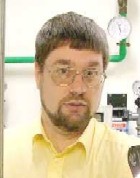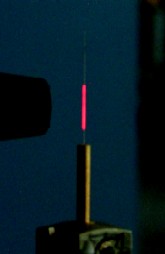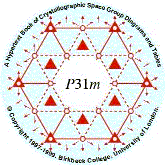|
| |
Academic Staff - Dr Jeremy Karl Cockcroft - Materials and Inorganic Chemistry
Personal StatementThe uncropped photo shows me standing next to the Stoe X-ray powder diffractometer with the small PSD mounted and looking at the newly-installed Oxford Instruments Cryojet. The latter is now used routinely for measuring samples cooled down to about 100 K and heated up to about 500 K. For very low temperature work down to about 5 K, we have aliquid-helium "orange" cryostat, similar in design to those used at ILL, Grenoble, and ISIS, RAL, but with clear mylar windows for use with a laboratory X-ray source, which has been installed and tested with much help from Martin Vickers and Mark Ellerby (in the Department of Physics at UCL). Our Stoe STADI-P instrument is used heavily as it gives more reliable intensity data, e.g. data suitable for structure refinement by the Rietveld method, than our older D500 Bragg-Brentano diffractometer. To complement the low-temperature facilities, a high-temperature furnaces has been developed in collaboration with G. Sankar. In contrast to many academics, I am very much a "hands-on" academic who likes to participate actively in experiments and help out students and post-docs alike, both in our PXRD laboratory and at large-scale central facilities, e.g. the X-ray synchrotron and neutron sources. So look for me in the PXRD labs before trying out my office (and certainly avoid phoning me in the latter without prior warning as I'm unlikely to answer your call)! Research InterestsDespite the fact that many of my current teaching duties are now in the classical area of Inorganic Chemistry, my research interests are very wide and diverse, though invariably they revolve around either X-ray (or sometimes neutron) diffraction studies of powder samples under a variety of conditions. I have studied polymorphism of organic molecules (particularly those of pharmaceutical interest), orientational order-disorder phase transitions in inorganic salts, magnetic phase transitions, structure solution by powder methods, solid-state kinetics, and I have even dabbled in protein crystallography. I am particularly interested in applying crystallography and diffraction methods to chemical problems. In particular, I find curiosity-driven experiments, and especially the serendipitous aspects of scientific research, highly stimulating and far more rewarding intellectually, than planned research based on delivery targets and short-term financial outcomes. Gant charts and their ilk are fine for managing complex projects, but do they encourage blue skies thinking? A few of my current interests are described in more detail below. Non-Ambient Crystallography Being updated...
In-Situ CrystallographyBeing updated... Pharmaceutical PolymorphismBeing updated... Commercial WorkThe commercial work in the group usually falls into one of two distinct areas. Firstly, research where there is a strong overlap between an academic interest and an industrial perspective. The sponsorship of a PhD studentship (for Fabio Lupo) by MEL Chemicals (a Luxfer Company) for a project involving in-situ crystallisation studies of zirconia is typical of this type of commercial work. Secondly, expert witness work usually related patent litigation. Much of the latter work is confidential and only enters the public domain when a case goes to trial, so few details can be given here. This latter type of commercial work is always carried out personally by myself including any required PXRD data collection and analysis. I am prepared to take on commercial work subject to the usual constraints provided by academic teaching and administration. An example of one recently completed case in the USA in which I acted as an expert PXRD witness is Lupin Ltd. et al. v. Abbott Laboratories and Astellas Pharma, Inc. et al., Civil Action No. 3:06-CV-400, involving a patent dispute over the antibiotic drug cefdinir. The case was settled a few days before trial. Selected Publications
Recent Refereed ArticlesBook and Web ArticlesUCL Administration
UCL Teaching
Link to Moodle web pages for UCL students (including coursework) External Administrative Duties
External Postgraduate Training Courses (Workshops & Schools)
LinksThis page last modified 7 May 2008 |
University College London |



